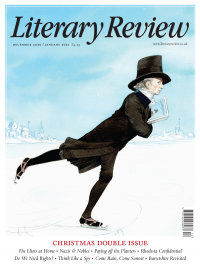Andrew Hussey
Deconstructionist Deconstructed
An Event, Perhaps: A Biography of Jacques Derrida
By Peter Salmon
Verso 312pp £16.99
When I went to university in 1982 to begin my degree in French, the philosopher and writer Jacques Derrida, who was then in his early fifties, was a kind of pop star. Peter Salmon notes this fact, remarking that the then fashionable band Scritti Politti had even written a song about him. The lyrics ran: ‘I’m in love with a Jacques Derrida/Read a page and know what I need to/Take apart my baby’s heart.’ At the time, it was hard to find an issue of NME, the bestselling music magazine that I slavishly devoured every Thursday, without a reference to Derrida, especially if it contained a piece by Paul Morley or Ian Penman. Derrida was hailed as the prophet of deconstruction (hence ‘take apart my baby’s heart’) and poststructuralism. It was never really made clear what these terms meant, but it was enough to know that Derrida was a rebel and a subversive and therefore cool; you could always try to work out what he was on about later.
In this book Salmon does an admirable job of explaining Derrida’s thinking. He begins by defining deconstruction as a way of reading books as texts. This makes them into objects, which can be read independently of the author’s original intentions and may indeed reveal the very opposite of what an author intended. In other words, books can mean whatever you want them to mean. This, of course, was deeply appealing to the rampantly iconoclastic undergraduate mind.
Salmon also describes how, for Derrida’s detractors, the theory of deconstruction undermined the very nature of literature itself. Most significantly, it enabled critics to present themselves as more important than the authors they deconstructed. Obviously, as Auberon Waugh commented, this had a great appeal for university teachers of literature, who,

Sign Up to our newsletter
Receive free articles, highlights from the archive, news, details of prizes, and much more.@Lit_Review
Follow Literary Review on Twitter
Twitter Feed
‘The Second World War was won in Oxford. Discuss.’
@RankinNick gives the question his best shot.
Nicholas Rankin - We Shall Fight in the Buttery
Nicholas Rankin: We Shall Fight in the Buttery - Oxford’s War 1939–1945 by Ashley Jackson
literaryreview.co.uk
For the first time, all of Sylvia Plath’s surviving prose, a massive body of stories, articles, reviews and letters, has been gathered together in a single volume.
@FionaRSampson sifts it for evidence of how the young Sylvia became Sylvia Plath.
Fiona Sampson - Changed in a Minute
Fiona Sampson: Changed in a Minute - The Collected Prose of Sylvia Plath by Peter K Steinberg (ed)
literaryreview.co.uk
The ruling class has lost its sprezzatura.
On porky rolodexes and the persistence of elite reproduction, for the @Lit_Review: